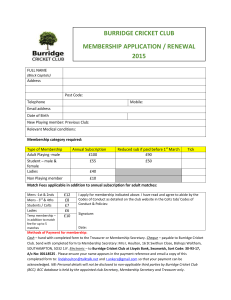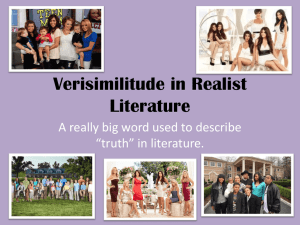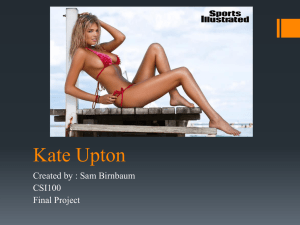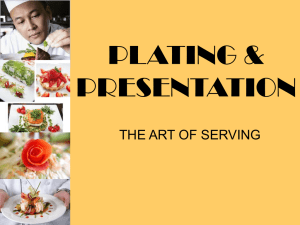Linguists` quotes on Language
advertisement
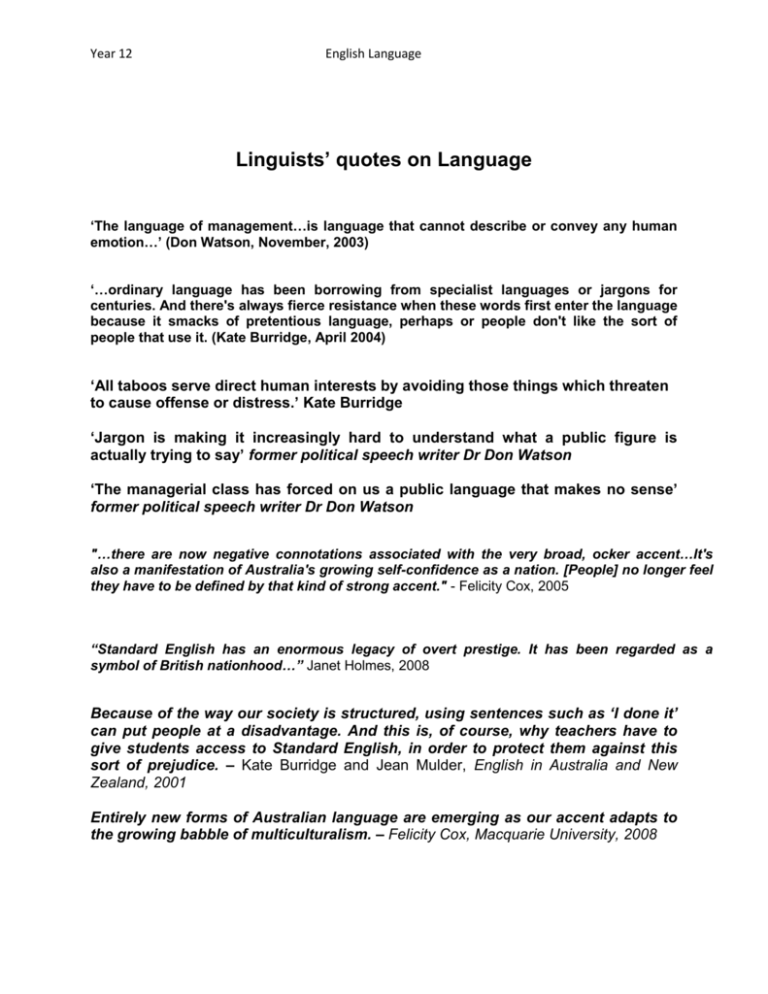
Year 12 English Language Linguists’ quotes on Language ‘The language of management…is language that cannot describe or convey any human emotion…’ (Don Watson, November, 2003) ‘…ordinary language has been borrowing from specialist languages or jargons for centuries. And there's always fierce resistance when these words first enter the language because it smacks of pretentious language, perhaps or people don't like the sort of people that use it. (Kate Burridge, April 2004) ‘All taboos serve direct human interests by avoiding those things which threaten to cause offense or distress.’ Kate Burridge ‘Jargon is making it increasingly hard to understand what a public figure is actually trying to say’ former political speech writer Dr Don Watson ‘The managerial class has forced on us a public language that makes no sense’ former political speech writer Dr Don Watson "…there are now negative connotations associated with the very broad, ocker accent…It's also a manifestation of Australia's growing self-confidence as a nation. [People] no longer feel they have to be defined by that kind of strong accent." - Felicity Cox, 2005 “Standard English has an enormous legacy of overt prestige. It has been regarded as a symbol of British nationhood…” Janet Holmes, 2008 Because of the way our society is structured, using sentences such as ‘I done it’ can put people at a disadvantage. And this is, of course, why teachers have to give students access to Standard English, in order to protect them against this sort of prejudice. – Kate Burridge and Jean Mulder, English in Australia and New Zealand, 2001 Entirely new forms of Australian language are emerging as our accent adapts to the growing babble of multiculturalism. – Felicity Cox, Macquarie University, 2008 Year 12 English Language Kate Burridge “a range of linguistic deodorisers, smokescreens and fig leaves” ‘Underhand euphemisms are used, not so much to conceal offense but to deliberately disguise a topic and deceive’ Kate Burridge "Language itself changes slowly but the internet has speeded up the process of those changes so you notice them more quickly.” - David Crystal “The accent is a thing that defines the Australian language, it’s that which defines Australian identity, and it’s that which has been utterly resilient and simply refuses to change.” “…we feel comfortable and not self-conscious any more, we’re very happy to express ourselves using the accent that we have” (Dr Felicity Cox, Phonetician, Macquarie University, Sounds of Aus, ABC, 2007) Quote Essay topic theme ‘The language of management…is language that cannot describe or convey any human emotion…’ (Don Watson, November, 2003) Formal language and obfuscation ‘…ordinary language has been borrowing from specialist languages or jargons for centuries. And there's always fierce resistance when these words first enter the language because it smacks of pretentious language, perhaps or people don't like the sort of people that use it. (Kate Burridge, April 2004) "Language itself changes slowly but the internet has speeded up the process of those changes so you notice them more quickly.” David Crystal Formal language and jargon Technology Year 12 English Language ‘All taboos serve direct human interests by avoiding those things which threaten to cause offense or distress.’ Kate Burridge Social harmony ‘Jargon is making it increasingly hard to understand what a public figure is actually trying to say’ former political speech writer Dr Don Formal Watson language and jargon "…there are now negative connotations associated with the very broad, ocker accent…It's also a manifestation of Australia's growing self-confidence as a Attitudes to nation. [People] no longer feel they have to be defined by that kind of strong varieties and accent." - Felicity Cox, 2005 accents and identity “Standard English has an enormous legacy of overt prestige. It has been regarded as a symbol of British nationhood…” Janet Holmes, 2008 Standard and non-standard Because of the way our society is structured, using sentences such as ‘I done it’ can put people at a disadvantage. And this is, of course, Attitudes to why teachers have to give students access to Standard English, in language order to protect them against this sort of prejudice. – Kate Burridge and Jean Mulder, English in Australia and New Zealand, 2001 varieties Entirely new forms of Australian language are emerging as our accent adapts to the growing babble of multiculturalism. – Felicity Varieties and Cox, Macquarie University, 2008 identity Kate Burridge “a range of linguistic deodorisers, smokescreens and fig leaves” Social harmony –euphemisms ‘Underhand euphemisms are used, not so much to conceal offense but to deliberately disguise a topic and deceive’ Kate Burridge Social harmony –euphemisms Year 12 English Language ‘The managerial class has forced on us a public language that makes Formal no sense’ former political speech writer Dr Don Watson language and obfuscation and expertise “The accent is a thing that defines the Australian language, it’s that which defines Australian identity, and it’s that which has been utterly resilient and simply refuses to change.” “…we feel comfortable and not self-conscious any more, we’re very happy to express ourselves using the accent that we have” (Dr Felicity Cox, Phonetician, Macquarie University, Sounds of Aus, ABC, 2007) Accent and language variety
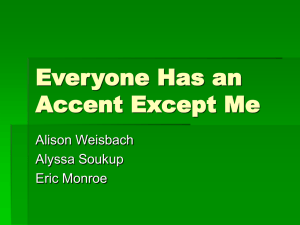
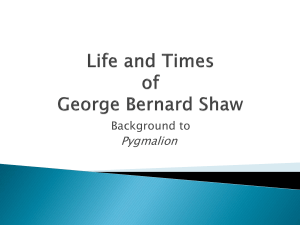
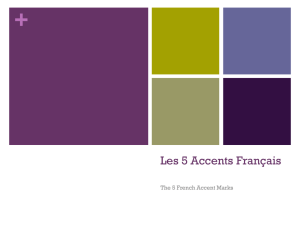
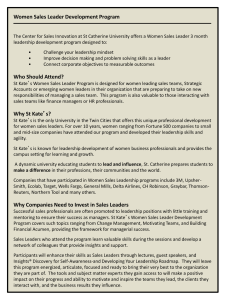
![The mysterious Benedict society[1]](http://s2.studylib.net/store/data/005310565_1-e9948b5ddd1c202ee3a03036ea446d49-300x300.png)
